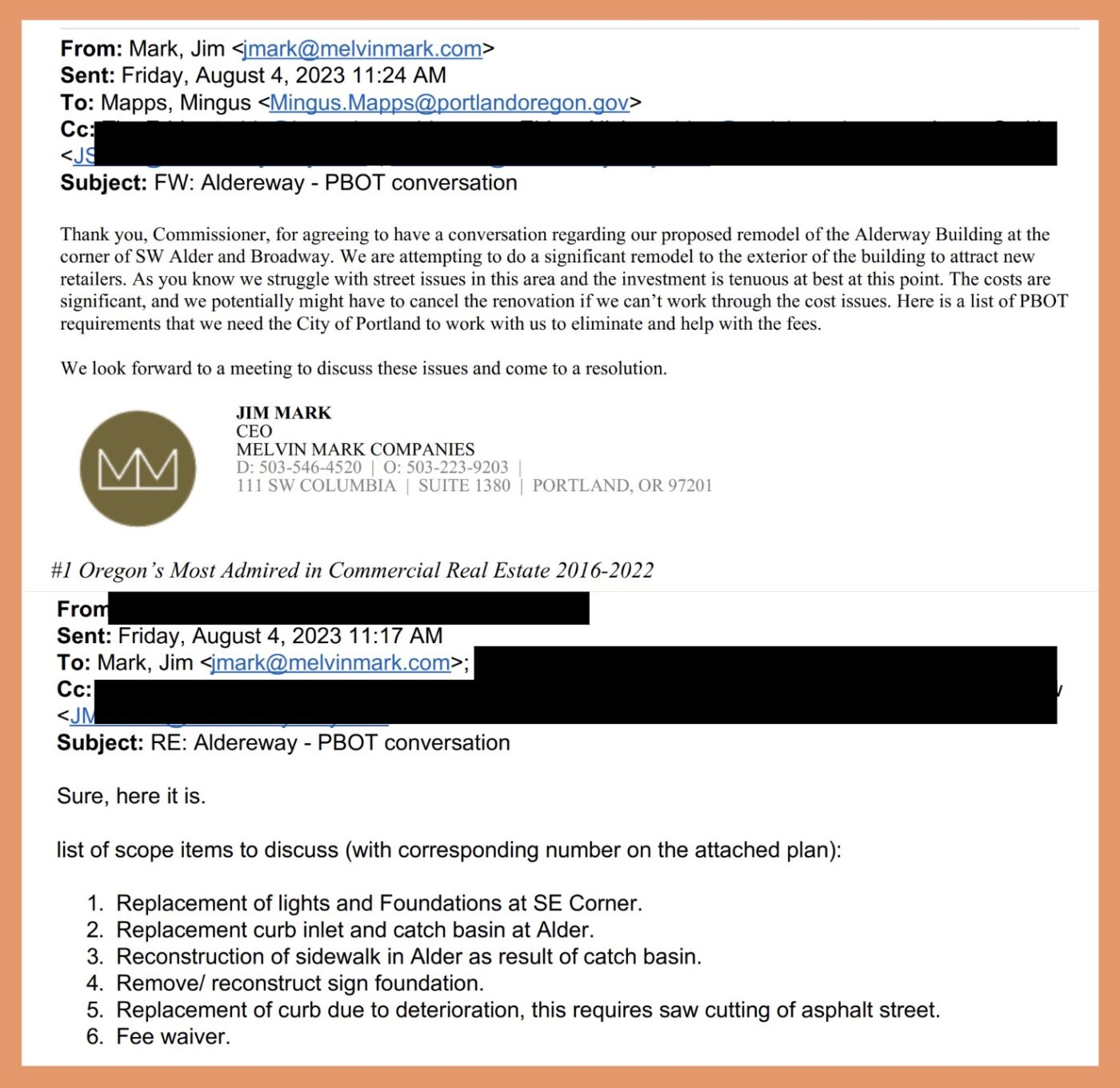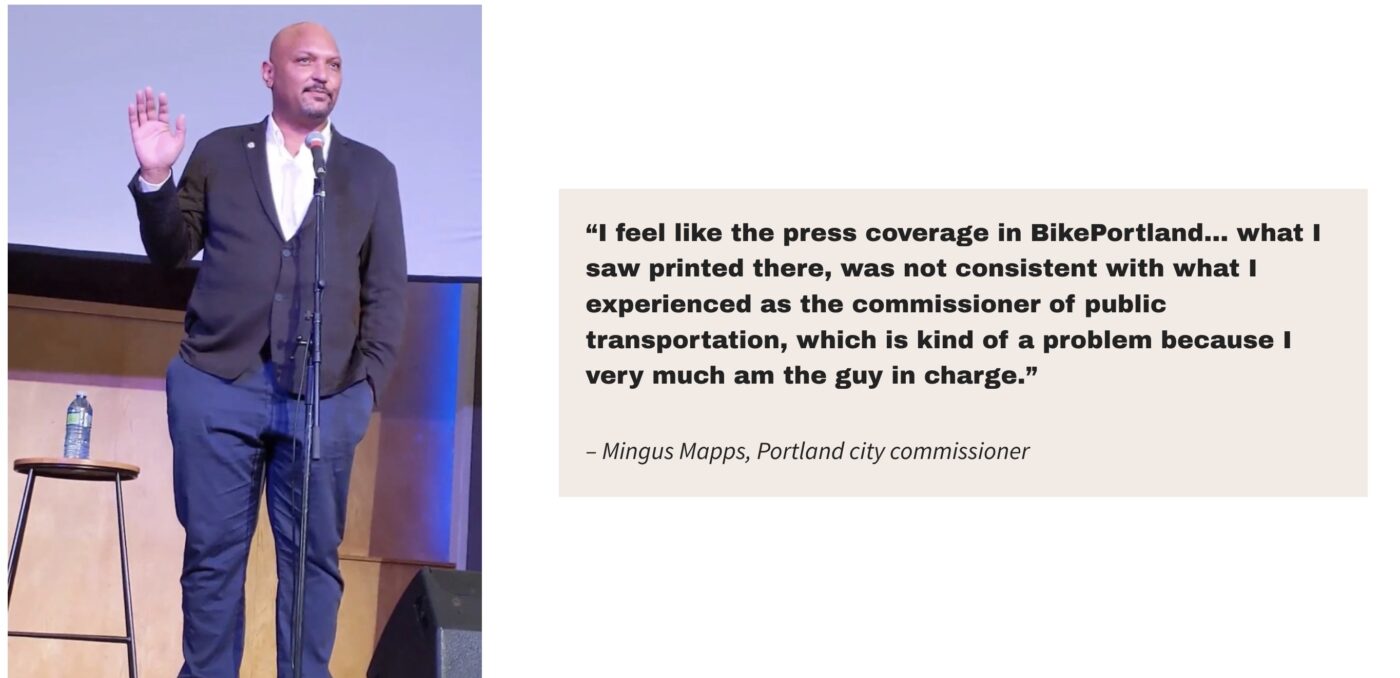
“I feel like the press coverage in BikePortland… was not consistent with what I experienced as the commissioner of public transportation, which is kind of a problem because I very much am the guy in charge.”
– Mingus Mapps, Portland city commissioner
Commissioner Mingus Mapps was asked about the “Broadway bike debacle” (a term he said he embraces) at his town hall event this past Sunday. His response left out key details and did not accurately reflect what happened. If the only thing someone heard about it was what Mapps said at that event, they would be misinformed and confused. They would also be likely to make incorrect assumptions about the nature of community concerns, the quality of reporting on BikePortland, and the nature of the commissioner’s own involvement in the scandal.
Despite clear facts available to the public in our detailed reporting that no one at the Portland Bureau of Transportation or Mapps’ office has offered to correct (even after given the opportunity), Mapps is misrepresenting what happened. He’s gaslighting the community by presenting a version of the story that is incomplete, he’s implying that what was reported on BikePortland isn’t accurate, and he’s telling the story in a way that absolves him of responsibility — despite the fact that, after facing tremendous pressure from the community, his bureau director was forced to scuttle plans she said he signed off on and she ultimately apologized for how it all went down.
I’ve let this story die down in recent weeks because I want PBOT and its Director Millicent Williams to have the opportunity to turn over a new leaf, learn from the mistakes, and move forward with their important work. But when Commissioner Mapps, in a public forum, represents the story in such a troubling way — and when he mentions BikePortland specifically — I feel compelled to set the record straight and share more information about what happened.
In his response to someone’s question at the town hall at Alberta Abbey in northeast Portland on Sunday, Mapps said, “I feel like the press coverage in BikePortland… what I saw printed there, was not consistent with what I experienced as the commissioner of public transportation, which is kind of a problem because I very much am the guy in charge.”
I agree with Mapps that this is a “problem.” If he’s the “guy in charge” then he should have known exactly what Director Williams was doing (he says he didn’t) and he should take responsibility for her actions — actions she said in an email he had signed off on.
It’s not clear if he’s saying BikePortland’s reporting was the problem or the actions of Director Williams were the problem (or both?). Regardless, if he’s going to mention a media outlet and say the words, “not consistent with what I experienced,” he should be much more clear what he’s talking about. And after saying that, he could have pivoted toward an embrace of the mistakes made by himself and/or Director Williams; but he didn’t do that.
He then laid out his version of what happened with the “debacle.” He made it seem like there was a big, public “conversation” going on around the design of the Broadway bike lane. That’s not true. The only conversation was between Mapps, Director Williams, and several downtown hotel owners and influential business interests.

We know from a public records request that Melvin Mark Investments (MMI) CEO Jim Mark was leading a campaign against the bike lane for months before Mapps gave Williams the order to make something happen. Mark is a former president of the Portland Metro Chamber and was recently named to Oregon Governor Tina Kotek’s Portland Central City Task Force. The Portland Metro Chamber (formerly Portland Business Alliance) is a group that endorsed Mapps’ city council bid, has donated to his campaign, and whose current president was opposed to the protected bike lanes on Broadway.
In October 2022, just one month before PBOT installed the parking protected bike lane on Broadway, Mark’s company purchased the Alderway Building on the northwest corner of SW Alder and Broadway. Commissioner Mapps was given PBOT leadership in January 2023. In May of 2023, Mark spoke strongly against the bike lane in a meeting where Mapps was present. A source who was at that meeting and asked to remain anonymous due to fear of retaliation, said Mark “just went off on the bike lane” and lambasted PBOT for spending money on them because he feels bike lanes are bad for business.
We also know from emails received in a public records request, that on August 4th, Mark emailed Commissioner Mapps about a proposed remodel of the Alderway Building (see above). “We are attempting to do a significant remodel to the exterior of the building to attract new retailers,” Mark said. “As you know we struggle with street issues in this area and the investment is tenuous at best at this point. The costs are significant, and we potentially might have to cancel the renovation if we can’t work through the cost issues.” Mark then laid out a list of things PBOT was requiring MMI to do as part of the remodel. “We need the City of Portland to work with us to eliminate and help with the fees,” Mark wrote.
That same day, Mapps’ former Chief of Staff Katie Meyer (who left his office at the end of September) emailed PBOT Director Williams and referred to a meeting with “Downtown stakeholders (led by Jim), the Commissioner and PBOT.” The “Jim” in that email was Jim Mark.
That meeting happened on August 14th. A source told BikePortland that a high-ranking PBOT staffer left that meeting saying, “Jim Mark’s got all the mics,” which they understood as a reference to Marks’ prominent role in pushing for changes on Broadway.
And one day after that meeting PBOT Director Williams emailed staff to say, “We need to meet about Broadway. Doing nothing is not an option.”
What we know is this: Mapps was aware of Mark’s dislike of the bike lane; Mapps had been pressured by Mark and his group of “downtown stakeholders” to help with his Alderway Building renovation project; the Broadway bike lane was discussed at at least one meeting; and that Mapps gave his PBOT Director clear orders to make changes happen quickly.
Given all this, Commissioner Mapps should be honest with the public: The changes he wanted to make on Broadway came as a direct result — not of a general “conversation” or concerns from the community made up of various road users — but from pressure and complaints from business interests.
At the town hall, Mapps then said, after having this “conversation,” he looked at a set of plans he felt would “both make the bike lanes safer, and at the same time, make that space work better for local businesses.”
The plan Mapps refers to here is the second (and much better) plan, the one that was revised after the first one caused such uproar and concerns from the community. Glossing over that detail is revisionist history and conveniently allows Mapps to portray himself as a much more reasonable actor in the story. It’s also notable that Mapps had no problem recalling the details of this plan; but vociferously and repeatedly denied ever even being aware of the first, more controversial, one.
“I know it’s very challenging and triggering when the Commissioner of Transportation goes in and tries to fine tune transportation projects,” Mapps continued. “But this is part of my responsibility as the guy in charge of our transportation system.”
To be clear: No one was triggered because Mapps wanted to “fine-tune” a project. Saying that within the context of his revisionist comments at the town hall makes is appear as if safe street advocates (and BikePortland) were simply overreacting to a small tweak. That’s gaslighting.
What Mapps’ leadership caused Director Williams to do was rip out 16 blocks of a major, high-profile protected bike lane that PBOT staff and advocates worked years to implement, and that was paid for by a federal grant (despite the director’s misleading statements to the contrary). What triggered so many people was that their city leaders were about to sacrifice their safety and reverse the design to an older, more dangerous version, and were ready to spend up to $500,000 of funding the agency doesn’t have to make it happen. And now we know they planned to do it “within the next 30 days” — according to an email from Director Williams to Mapps’ office on September 14th — without any public input and over the strong warnings of PBOT staff.
Then, when their plan was exposed, they gave the community PR spin instead of the truth. That’s why so many people were “triggered.”
Mapps wants to be mayor of Portland. He owes it to our city to be forthright and to carry out the policies of his bureaus — even if it goes against the wishes of powerful people who have his ear.
— For a video version of this op-ed, see this video on our YouTube channel or on Instagram.





